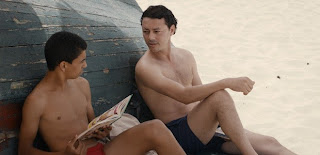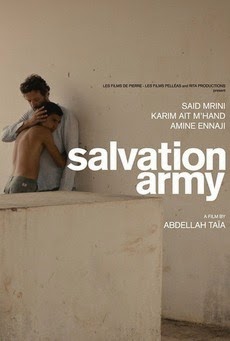 Abdellah is a young teenager who lives with his poor large family in an overcrowded small house in Casablanca. He spends his days helping his sisters doing household chores at the behest of his mother who seems perpetually angry with him. Her bad-tempered-ness could be because as he is male she associates him closely with her husband who she hates because of his physical abuse, but it’s more likely because she knows that Abdellah is different than other boys.
Abdellah is a young teenager who lives with his poor large family in an overcrowded small house in Casablanca. He spends his days helping his sisters doing household chores at the behest of his mother who seems perpetually angry with him. Her bad-tempered-ness could be because as he is male she associates him closely with her husband who she hates because of his physical abuse, but it’s more likely because she knows that Abdellah is different than other boys.Even at this age Abdellah seems accepting of his homosexuality and willing has sexual encounters with older local men who approach him in the dusty neighborhood streets. But he also knows the risk of abuse and violence that he takes by doing this, and his dream is to be able to leave this back-water when he is old enough and live somewhere he can be himself.
 His elder brother Slimane who he silently idolises in an almost unhealthy way, takes Abdellah and his younger brother Mustapha for a weekend vacation by the sea, but when Slimane abandons them to hang out with a waitress, Abdellah cruises a older European man and offers himself up too him.
His elder brother Slimane who he silently idolises in an almost unhealthy way, takes Abdellah and his younger brother Mustapha for a weekend vacation by the sea, but when Slimane abandons them to hang out with a waitress, Abdellah cruises a older European man and offers himself up too him.Fast forward 10 years, Abdellah now grown up and is living in a beautiful apartment in Casablanca owned by a Swiss Professor who obviously adores him. You can however see from Abdellah’s face which is sullen at the best of times, that he doesn’t feel the same about his partner. He does however use him to gain a Visa and a Grant to go study in the Professor’s University in Geneva, and once this happens, he immediately dumps his benefactor even though it leaves him homeless and penniless in an alien country.
The final scene sees Abdellah finally getting refuge in the Salvation Army Hostel where he meets up with a fellow Moroccan who starts singing a song. It’s one of Abdellah’s favorites from when he and his sisters were crowded around their small TV set watching Egyptian movies which spun tales of freedom and love, and was one of this his few happy childhood memories. Now he at last has his freedom.
This quiet measured piece belies its powerful ground-breaking context. Written and directed by Abdellah Taia, who was the first Moroccan writer to ever come out publicly, and it is based on one of Taia’s own autobiographically based novel. In this his debut movie, Taia claims that it is the first one ever to have a gay Arab protagonist, and although it has a finely tuned Moroccan sensitivity to it …. especially with all of the reticence to voice things but just imply them …. it will be easy for audiences to be able to relate too, especially gay ones.
Taia’s voice is one that needs to be heard, and I realise that on paper it seems like his Abdellah is a heartless soul, but he is far from that and his struggle for his identity and truth validates his methods. This movie (that Taia actually managed to discreetly film in Morocco) deserves a wide audience to appreciate how tough it still is to be oneself in so many parts of the world.
This movie has just had its premiere at Venice Film Festival but is now about to finally get a theatrical release in the US.
P.S. I hope there will soon be other gay Arab movies to follow, check out Out Loud from Lebanon that I reviewed this summer.
>

